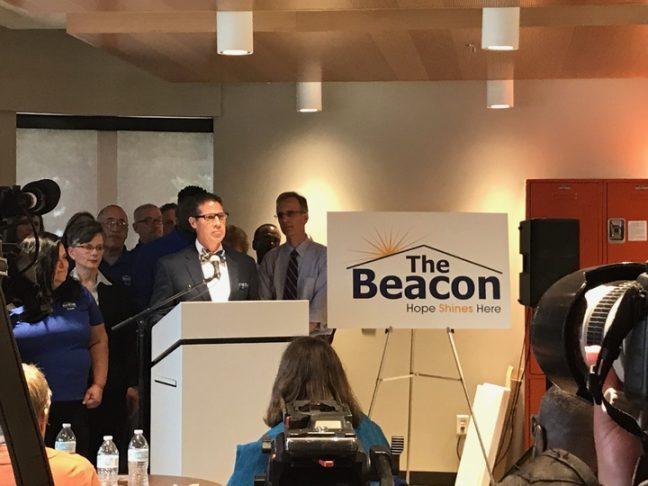Wisconsin Republicans voted to reject homelessness relief initiatives in Gov. Tony Evers’ proposed budget May 20. According to Associated Press News, Evers planned to spend about $73 million on affordable housing and other programs. The Republican-controlled Joint Finance Committee voted 12–4 to increase housing assistance funding by $1.2 million instead.
At the end of June, the complete budget made its way through the Wisconsin Legislature, but it no longer includes many of Evers’ major initiatives, including legalizing marijuana and raising the minimum wage, according to a Wisconsin Public Radio article.
WPR reported Republican lawmakers urged Evers to sign off on the new version. Evers said, however, he isn’t certain he will approve of the entire revised budget.
According to WisContext, Wisconsin’s governors have veto powers other governors don’t have — namely, partial vetoes which enable a governor to remove single sentences or words from bills.
Evers, businesses in conflict over employee COVID-19 information release
According to the Wisconsin Budget Project, Wisconsin operates on a biennial budget. Once the governor proposes the budget, it goes to the Joint Finance Committee. The committee holds hearings and public comments about bills to gather more information before they go to the Legislature. After the hearings, the committee proposes its own version of the budget, which can vary greatly from the governor’s plan.
The Milwaukee Journal Sentinel said Evers planned to provide $5 million a year to homeless shelters in his May plan. The Joint Finance Committee voted to increase funding for shelters by only $600,000 and rejected Evers’ proposal to grant local municipalities $50 million to fund moderate-income and low-income housing.
According to the Milwaukee Journal Sentinel, Rep. Amy Loudenbeck, R-Clinton, said due to the millions of dollars of federal aid that housing programs in Wisconsin acquired, committee members chose to reject Evers’ plans.
“As a matter of fact, the Joint Finance Committee tripled funding for the Housing Assistance Program which provides grants to local governments as well as non-profits and for-profits to operate housing and supporting services for homeless individuals,” Loudenbeck said in an email to The Badger Herald, adding the goal of these programs is to move homeless people towards independent living.
The COVID-19 pandemic exacerbate the already-existing issue of homelessness. According to United Way, Milwaukee had the eighth most evictions due to COVID-19 out of all American cities.
Census data shows Wisconsin on crest of losing one House of Representative seat
In Kenosha, Tiara Harell and her 8-year-old daughter decided to hand out supplies and gifts to homeless people in their community. Harell’s daughter came up with the idea of “blessing bags” during the COVID-19 pandemic. The bags contain hand warmers, socks, snacks and other necessities for the homeless.
Harell said Kenosha lacks the affordable housing present in Milwaukee and Racine. She added that many people were displaced when buildings burned down during riots in Kenosha last year.
Madison has also been struggling with how COVID-19 has affected homelessness. Nicolas Lemus works at the Beacon, a service center and shelter for homeless people in Madison. He said the COVID-19 pandemic made it difficult for the Beacon to house as many people as they used to because of possible transmission of the virus, but the federal eviction moratorium kept the homeless population from spiking too much in the midst of the pandemic.
The government established an eviction moratorium to make it illegal for landlords to kick out renters in most cases. But, the WPR reported a federal judge recently threw out the moratorium. The U.S. Department of Justice appealed this ruling and added an emergency stay on the order, which will stay in place until a higher court makes a decision, according to WPR.
SARJ petitions to rename Women’s Health Clinic to promote more inclusive care
“This means the moratorium remains in place for now,” DOJ Director of the Office of Public Affairs Anthony Coley said.
Executive Director of the Wisconsin Coalition Against Homelessness Joe Volk said evictions ended under the federal moratorium, but tenants are still legally obligated to pay rent. Therefore, people will owe multiple months of rent once the moratorium ends.
“That’s always the date that we dread — when the eviction moratorium is over — because we know we’re going to see a huge influx of people,” Lemus said.
The Dane County government has taken certain steps to help the local homeless population. The Wisconsin State Journal reported Dane County initiated a new federally-funded program to house people who were previously living in hotels.
During the height of the pandemic, Dane County housed people displaced from their homes in local hotels, according to the Wisconsin State Journal. The hotel rooms were funded through federal COVID-19 relief money and are expected to have cost $23 million by the end of August. Dane County’s $13 million program aims to move these people into affordable housing units.
Volk said people can fight for better homelessness assistance programs by calling their local representatives and volunteering.
“Call 211 or your local United Way to access volunteer opportunities,” Volk said.














